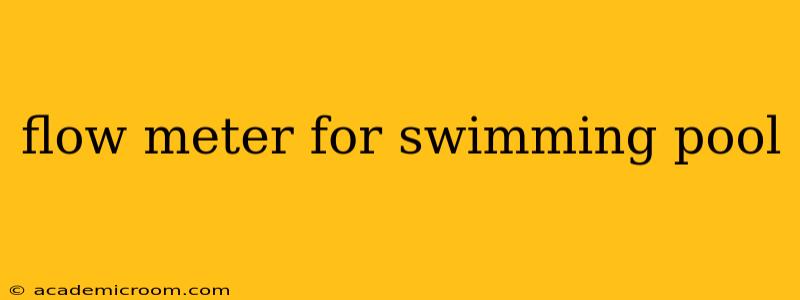Maintaining a sparkling clean and healthy swimming pool requires diligent upkeep, and a crucial element of this process is ensuring proper water circulation. This is where a flow meter for a swimming pool comes in. This comprehensive guide will explore the different types of flow meters, their applications, benefits, and how to choose the right one for your pool.
What is a Swimming Pool Flow Meter?
A swimming pool flow meter is a device that measures the rate at which water flows through your pool's filtration system. This measurement, typically displayed in gallons per minute (GPM) or liters per minute (LPM), is crucial for monitoring the efficiency of your pump and ensuring your pool's water is properly filtered and circulated. Without adequate flow, your pool's water quality can suffer, leading to issues like algae growth, cloudy water, and potentially harmful bacteria.
Types of Flow Meters for Swimming Pools
Several types of flow meters are suitable for swimming pool applications. The best choice depends on your specific needs and budget:
1. Paddle Wheel Flow Meters:
These are relatively inexpensive and easy to install. A rotating paddle wheel interacts with the water flow, and the rotation speed is directly proportional to the flow rate. While simple, they can be less accurate than other options, especially at low flow rates.
2. Ultrasonic Flow Meters:
Ultrasonic flow meters use sound waves to measure the flow rate. They are non-invasive, meaning they don't require breaking into the pipe, and offer higher accuracy than paddle wheel meters. However, they tend to be more expensive.
3. Magnetic Flow Meters:
Magnetic flow meters measure the voltage induced by the movement of conductive water through a magnetic field. They are highly accurate and can handle a wide range of flow rates, but are generally more costly and suitable for larger commercial pools.
4. Turbine Flow Meters:
Similar to paddle wheel meters, turbine flow meters use a rotating turbine to measure flow. They are generally more durable and accurate than paddle wheel meters, but also more expensive.
How Does a Flow Meter Help Maintain My Pool?
A flow meter provides several critical benefits for pool maintenance:
- Optimizes Pump Performance: By monitoring flow rate, you can ensure your pump is operating at its optimal efficiency. If the flow is too low, it might indicate a problem with the pump, filter, or plumbing.
- Improves Water Quality: Proper water circulation is essential for keeping your pool clean and healthy. A flow meter helps ensure the water is filtered and treated effectively.
- Early Problem Detection: A sudden drop in flow rate can signal a problem with your filter, pump, or plumbing, allowing you to address the issue before it becomes major and costly.
- Saves Energy: By optimizing pump operation, a flow meter can help reduce energy consumption, saving you money on your utility bills.
- Extends Equipment Lifespan: Maintaining proper flow rates reduces strain on your pool equipment, extending its lifespan and reducing the need for frequent repairs or replacements.
What Size Flow Meter Do I Need?
The size of the flow meter you need depends on the size of your pool and your filtration system. Consult your pool's specifications or a pool professional for guidance on selecting the appropriate size. Improper sizing can lead to inaccurate readings or damage to the flow meter.
How Often Should I Check My Pool's Flow Rate?
Regularly checking your pool's flow rate is a good preventative measure. Aim to check it at least once a month, or more frequently if you suspect a problem with your filtration system.
Can I Install a Flow Meter Myself?
While some flow meters are relatively easy to install, others require professional expertise. Consult the manufacturer's instructions and consider seeking help from a qualified pool technician if you are unsure about the installation process.
What are the Costs Associated with Pool Flow Meters?
The cost of a pool flow meter varies greatly depending on the type, size, and brand. Expect to pay anywhere from a few hundred dollars for a basic paddle wheel meter to several thousand dollars for a more sophisticated ultrasonic or magnetic flow meter.
This guide provides a comprehensive overview of flow meters for swimming pools. Remember to consult with a pool professional to determine the best type and size of flow meter for your specific needs. Proper water circulation is a key factor in maintaining a clean, safe, and enjoyable swimming pool.
